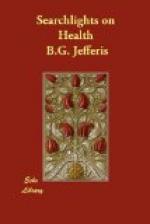9. EARLY MARRIAGES.—There can be no doubt that early marriages are bad for both parties. For children of such a marriage always lack vitality. The ancient Germans did not marry until the twenty-fourth or twenty-fifth year, previous to which they observed the most rigid chastity, and in consequence they acquired a size and strength that excited the astonishment of Europe. The present incomparable vigor of that race, both physically and mentally, is due in a great measure to their long established aversion to marrying young. The results of too early marriages are in brief, stunted growth and impaired strength on the part of the male; delicate if not utterly bad health in the female; the premature old age or death of one or both, and a puny, sickly offspring.
10. SIGNS OF EXCESSES.—Dr. Dio Lewis says: “Some of the most common effects of sexual excess are backache, lassitude, giddiness, dimness of sight, noises in the ears, numbness of the fingers, and paralysis. The drain is universal, but the more sensitive organs and tissues suffer most. So the nervous system gives way and continues the principal sufferer throughout. A large part of the premature loss of sight and hearing, dizziness, numbness and pricking in the hands and feet, and other kindred developments, are justly chargeable to unbridled venery. Not unfrequently you see men whose head or back or nerve testifies of such reckless expenditure.”
11. NON-COMPLETED INTERCOURSE.—Withdrawal before the emission occurs is injurious to both parties. The soiling of the conjugal bed by the shameful manoeuvres is to be deplored.
12. THE EXTENT OF THE PRACTICE.—One cannot tell to what extent this vice is practiced, except by observing its consequences, even among people who fear to commit the slightest sin, to such a degree is the public conscience perverted upon this point. Still, many husbands know that nature often renders nugatory the most subtle calculations, and reconquers the rights which they have striven to frustrate. No matter; they persevere none the less, and by the force of habit they poison the most blissful moments of life, with no surety of averting the result that they fear. So who knows if the too often feeble and weakened infants are not the fruit of these in themselves incomplete procreations, and disturbed by preoccupations foreign to the natural act.
13. HEALTH OF WOMEN.—Furthermore, the moral relations existing between the married couple undergo unfortunate changes; this affection, founded upon reciprocal esteem, is little by little effaced by the repetition of an act which pollutes the marriage bed. If the good harmony of families and the reciprocal relations are seriously menaced by the invasion of these detestable practices, the health of women, as we have already intimated, is fearfully injured.
14. CROWNING SIN OF THE AGE.—Then there is the crime of abortion which is so prevalent in these days. It is the crowning sin of the age, though in a broader sense it includes all those sins that are committed to limit the size of the family. “It lies at the root of our spiritual life,” says Rev. B.D. Sinclair, “and though secret in its nature, paralyzes Christian life and neutralizes every effort for righteousness which the church puts forth.”




